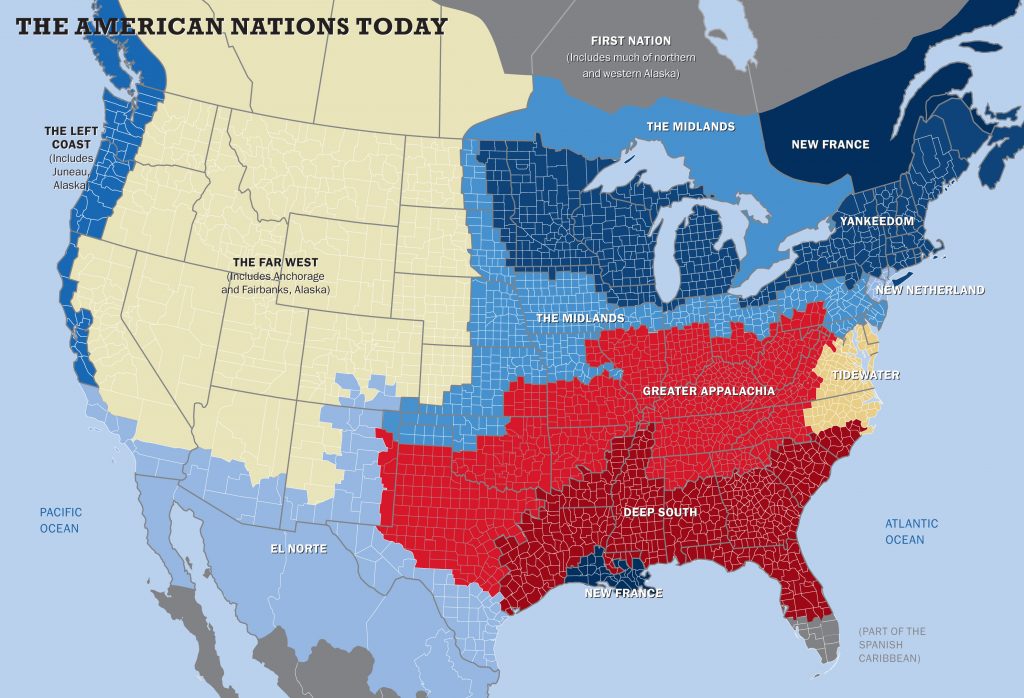Editor’s note: Here follows the fifthteenth chapter of The Story of the Malakand Field Force: An Episode of Frontier War, by Winston S. Churchill (published 1898). All spelling in the original.
CHAPTER XV: THE WORK OF THE CAVALRY
The negotiations of the Mamunds had this time opened under more propitious circumstances. The tribesmen were convinced by the arrival of the large reinforcements that the Government were in earnest. The return of “the big general,” as they called Sir Bindon Blood, to distinguish him from the brigadiers, impressed them with the fact that the operations would be at once renewed, if they continued recalcitrant. They had still a few villages unburned, and these they were anxious to save. Besides, they disliked the look of the long topes, or field guns, of whose powers they were uncertain. They therefore displayed a much more humble spirit.
On the other hand, every one in the force had realised that there were “more kicks than ha’pence” to be got out of the Mamund Valley. All the villages in the plain had been destroyed. Only a few of those in the hollows of the hills remained. To these the enemy had retired. In Arrian’s History of Alexander’s Conquests we read the following passage: “The men in Bazira [Bazira is the same as Bajaur], despairing of their own affairs, abandoned the city… and fled to the rock, as the other barbarians were doing. For all the inhabitants deserted the cities, and began to fly to the rock which is in their land.” Then it was that Alexander’s difficulties began. Nor need we wonder, when the historian gravely asserts that “so stupendous is the rock in this land… that it was found impregnable even by Heracles, the son of Zeus.” Thus history repeats itself, and the people of Bajaur their tactics. There was, however, no doubt as to the ability of the brigades to take and burn any village they might select. At the same time it was certain that they would encounter relays of Afghan tribesmen, and regular soldiers from the Amir’s army, and that they would lose officers and men in the operation. The matter had to be carried to a conclusion at whatever cost, but the sooner the end was reached, the better.
But in spite of the auguries of peace, the foraging parties were usually fired upon, and this furnished several opportunities for the display of the value of the cavalry. I shall avail myself of the occasion to review the performances of the mounted arm during the operations. As soon as the brigades entered Bajaur, the 11th Bengal Lancers were employed more and more in that legitimate duty of cavalry—reconnaissance. Major Beatson made daily expeditions towards the various valleys and passes about which information was needed. This use of cavalry is an entirely new one on the frontier—it having been thought that it was dangerous to employ them in this way. Though horsemen need good ground to fight on to advantage, they can easily move over any country, however broken, and where they are boldly used, can collect as much information as is necessary.
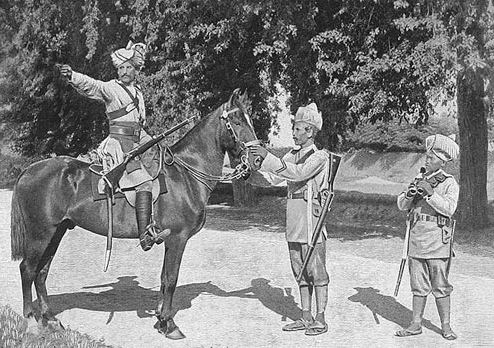
Reconnaissance is by no means the only opportunity for cavalry employment on the frontier. They are as formidable in offensive tactics as they are useful in collecting intelligence.
The task which is usually confided to them in these mountain actions is to protect one of the flanks. The ground hardly ever admits of charging in any formation, and it is necessary for the men to use their carbines. On 30th September the cavalry were so employed. On the left of the hostile position was a wide valley full of scrubby trees, and stone walls, and occupied by large numbers of the enemy. Had these tribesmen been able to debouch from this valley, they would have fallen on the flank of the brigade, and the situation would have become one of danger. For five hours two weak squadrons of the Guides Cavalry were sufficient to hold them in check.
The methods they employed are worth noticing. Little groups of six or seven men were dismounted, and these with their carbines replied to the enemy’s fire. Other little groups of mounted men remained concealed in nullahs or hollows, or behind obstacles. Whenever the enemy tried to rush one of the dismounted parties, and to do so advanced from the bad ground, the mounted patrols galloped forward and chased them back to cover. The terror that these tribesmen have of cavalry contrasts with their general character. It was a beautiful display of cavalry tactics in this kind of warfare, and, considering the enormous numbers of the enemy, who were thus kept from participating in the main action, it demonstrated the power and value of the mounted arm with convincing force.
On the 6th of October, I witnessed some very similar work, though on a smaller scale. A squadron was engaged in covering the operations of a foraging party. A line of patrols, moving rapidly about, presented difficult targets to the enemy’s sharpshooters. I found the remainder of the squadron dismounted in rear of a large bank of stones. Twenty sowars with their carbines were engaged in firing at the enemy, who had occupied a morcha—a small stone fort—some 300 yards away. Desultory skirmishing continued for some time, shots being fired from the hills, half a mile away, as well as from the morcha. Bullets kept falling near the bank, but the cover it afforded was good and no one was hurt. At length word was brought that the foraging was finished and that the squadron was to retire under cover of the infantry. Now came a moment of some excitement. The officer in command knew well that the instant his men were mounted they would be fired at from every point which the enemy held. He ordered the first troop to mount, and the second to cover the retirement. The men scrambled into their saddles, and spreading out into an extended line cantered away towards a hollow about 300 yards distant. Immediately there was an outburst of firing. The dust rose in spurts near the horsemen, and the bullets whistled about their ears. No one was however hit. Meanwhile, the remaining troop had been keeping up a rapid fire on the enemy to cover their retirement. It now became their turn to go. Firing a parting volley the men ran to their horses, mounted, and followed the first troop at a hand-gallop, extending into a long line as they did so. Again the enemy opened fire, and again the dusty ground showed that the bullets were well directed. Again, however, nobody was hurt, and the sowars reached the hollow, laughing and talking in high glee. The morning’s skirmish had, nevertheless, cost the squadron a man and a horse, both severely wounded.
Such affairs as these were of almost daily occurrence during the time that the 2nd Brigade occupied the camp at Inayat Kila. They were of the greatest value in training the soldiers. The Guides Cavalry know all there is to know of frontier war, but there are many other regiments who would be made infinitely more powerful fighting organisations if they were afforded the opportunity for such experience.
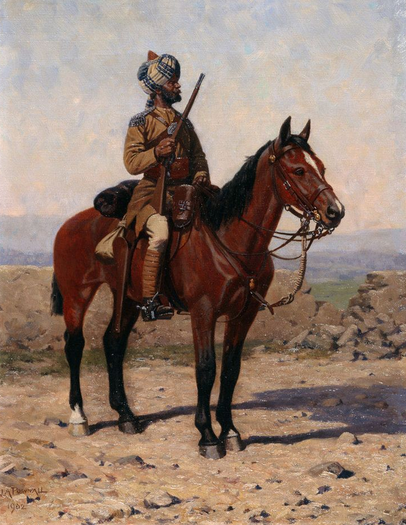
The great feature which the war of 1897 on the Indian Frontier has displayed is the extraordinary value of cavalry. At Shabkadr a charge of the 13th Bengal Lancers was more than successful. In the Swat Valley, during the relief of Chakdara, the Guides Cavalry and 11th Bengal Lancers inflicted the most terrible loss on the enemy. To quote the words of Sir Bindon Blood’s official report to the Adjutant-General, these regiments, “eager for vengeance, pursued, cut up and speared them in every direction, leaving their bodies thickly strewn over the fields.” Again, after the action of Landakai, the cavalry made a most vigorous pursuit and killed large numbers of the enemy. While I was with the Malakand Field Force, I was a witness of the constant employment of the cavalry, and was several times informed by general officers that they would gladly have a larger number at their disposal. The reader may recall some of the numerous instances which these pages have recorded of cavalry work. On the morning of the 15th September, it was the cavalry who were able to catch up the enemy before they could reach the hills, and take some revenge for the losses of the night. In the action of the 16th, the charge of Captain Cole’s squadron brought the whole attack of the enemy to a standstill, and enabled the infantry by their fire to convert the hesitation of the tribesmen into a retreat. Indeed, in every fight in the Mamund Valley, the cavalry were the first in, and the last out. In the official despatches Sir Bindon Blood thus alludes to the work of the cavalry:—”I would now wish to invite attention to the invaluable nature of the services rendered by the cavalry. At Nawagai, three squadrons of the 11th Bengal Lancers swept the country everywhere that cavalry could go, carrying out reconnaissances, protecting signalling parties and watching every movement of the enemy. In the Mamund Valley a squadron of the same regiment, under Captain E.H. Cole, took part in every engagement that occurred while they were there, establishing such a reputation that the enemy, even when in greatly superior numbers, never dared to face them in the open. Afterwards, when Captain Cole and his men left the Mamund Valley, the Guides Cavalry, under Lieut.-Col. Adams, being in greater strength, acted still more effectually in the same manner, showing tactical skill of a high order, combined with conspicuous gallantry.”—Official Despatches. From Gazette of India, 3rd December, 1897.
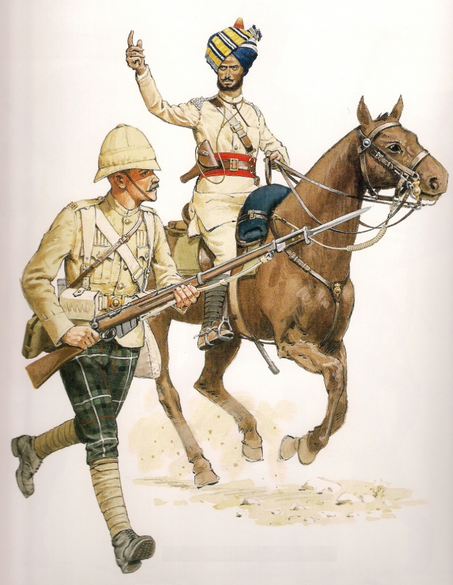
There has been a boom in cavalry. But one section, and that the most important, has been deprived of its share in the good fortune. The authorities have steadily refused to allow any British cavalry to cross the frontier. Of course this is defended on the ground of expense. “British cavalry costs so much,” it is said, “and natives do the work just as well.” “Better,” say some. But it is a poor kind of economy thus to discourage a most expensive and important branch of the service. The ambition that a young officer entering the army ought to set before him, is to lead his own men in action. This ought to inspire his life, and animate his effort. “Stables” will no longer be dull, when he realises that on the fitness of his horses, his life and honour may one day depend. If he thinks that his men may soon be asked to stand beside him at a pinch, he will no longer be bored by their interests and affairs. But when he realises that all is empty display, and that his regiment is a sword too costly to be drawn, he naturally loses keenness and betakes himself to polo as a consolation. It is a good one.
It was my fortune to meet many young men in frontier regiments, both cavalry and infantry, who had already served in three, and even four, campaigns. Daring, intelligent and capable, they are proofs of the value of their training, and are fit to lead their men under any conditions, and in any country. Subalterns in British cavalry regiments do occasionally manage to see a little active service as transport officers, signalling officers, war correspondents, or on the staff; but to lead in the field the men they have trained in peace, is a possibility which is never worth contemplating. To the young man who wants to enjoy himself, to spend a few years agreeably in a military companionship, to have an occupation—the British cavalry will be suited. But to the youth who means to make himself a professional soldier, an expert in war, a specialist in practical tactics, who desires a hard life of adventure and a true comradeship in arms, I would recommend the choice of some regiment on the frontier, like those fine ones I have seen, the Guides and the 11th Bengal Lancers.
I am aware that those who criticise an existing state of things ought to be prepared with some constructive legislation which would remedy the evils they denounce. Though it is unlikely that the Government of India will take my advice, either wholly or in good part, I hereby exhort them to quit the folly of a “penny wise” policy, and to adhere consistently to the principles of employing British and native troops in India in a regular proportion. That is to say, that when two native cavalry regiments have been sent on service across the frontier, the third cavalry regiment so sent shall be British.
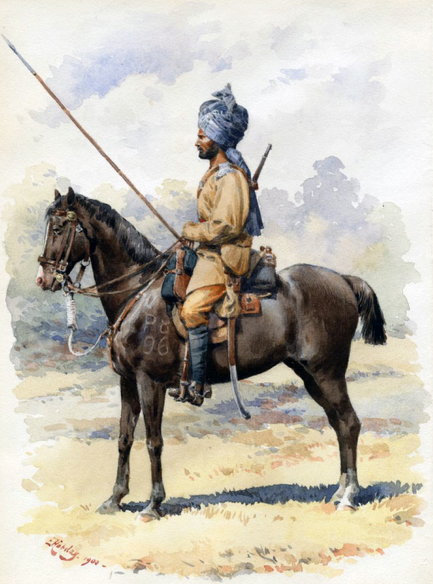
Besides this, in order to give cavalry officers as many opportunities of seeing active service as possible, subalterns should be allowed to volunteer for emergency employment with native cavalry. I have talked to several officers who command native cavalry regiments, and they tell me that such an arrangement would work excellently, and that, as they are always short of officers, it would supply a want. I would suggest that subalterns should, with the approval of their colonels, be attached to the native regiment, and after passing in Hindustani and being reported as qualified to serve with the native troops, be considered available for employment as described. I shall be told there are financial difficulties. I do not believe this. There are plenty of cavalry subalterns whose eagerness to see service is so strong, that they would submit to any arrangement that the rapacity of Government might impose. Indeed there is no reason that an actual economy should not be effected. The sums of money that the Indian Government offer, as rewards for officers who can speak Hindustani, have not hitherto tempted many cavalry officers to make a study of the language. Here is an incentive, more powerful and costing nothing.
To be technical is, I am aware, a serious offence, and I realise that if this book ever obtained so evil a reputation it would be shunned, as the House of Commons is shunned on a Service night. I have strayed far away from the Malakand Field Force into the tangled paths of military controversy, and I must beg the reader to forgive, as he will surely forget, what has been written.
The fighting described in the last chapter, and the continual drain of disease, had again filled the field hospitals, and in order to preserve the mobility of the force, it was decided to send all sick and wounded down to the base at once. The journey—over 100 miles by road—would take nearly a fortnight, and the jolting and heat made such an experience a painful and weary one to injured men. But the stern necessities of war render these things inevitable, and the desire of the men to get nearer home soothes much of their suffering. The convoy of sick and wounded was to be escorted as far as the Panjkora River by the Royal West Kent, who were themselves in need of some recuperation. To campaign in India without tents is always a trial to a British regiment; and when it is moved to the front from some unhealthy station like Peshawar, Delhi, or Mian Mir, and the men are saturated with fever and weakened by the summer heats, the sick list becomes long and serious. Typhoid from drinking surface water, and the other various kinds of fever which follow exposure to the heats of the day or the chills of the night, soon take a hundred men from the fighting strength, and the general of an Indian frontier force has to watch with equal care the movements of the enemy and the fluctuations of the hospital returns. As soon, therefore, as Sir Bindon Blood saw that the Mamunds were desirous of peace, and that no further operations against them were probable, he sent one of his British regiments to their tents near the Panjkora.
About sixty wounded men from the actions of 30th September and 3rd October, and the same number of sick, formed the bulk of the convoy. The slight cases are carried on camels, in cradles made by cutting a native bedstead in two, and called “Kajawas.” The more serious cases are carried in doolies or litters, protected from the sun by white curtains, and borne by four natives. Those who are well enough ride on mules. The infantry escort is disposed along the line with every precaution that can be suggested, but the danger of an attack upon the long straggling string of doolies and animals in difficult and broken ground is a very real and terrible one.
The cheeriness and patience of the wounded men exceeds belief. Perhaps it is due to a realisation of the proximity in which they have stood to death; perhaps partly to that feeling of relief with which a man turns for a spell from war to peace. In any case it is remarkable. A poor fellow—a private in the Buffs—was hit at Zagai, and had his arm amputated at the shoulder. I expressed my sympathy, and he replied, philosophically: “You can’t make omelettes without breaking eggs,” and after a pause added, with much satisfaction, “The regiment did well that day.” He came of a fighting stock, but I could not help speculating on the possible future which awaited him. Discharge from the service as medically unfit, some miserable pension insufficient to command any pleasures but those of drink, a loafer’s life, and a pauper’s grave. Perhaps the regiment—the officers, that is to say—would succeed in getting him work, and would from their own resources supplement his pension. But what a wretched and discreditable system is that, by which the richest nation in the world neglects the soldiers who have served it well, and which leaves to newspaper philanthropy, to local institutions, and to private charity, a burden which ought to be proudly borne by the State.
Starting at six, the column reached Jar, a march of eight miles, at about ten o’clock. Here we were joined by a wing of the 24th Punjaub Infantry, who were coming up to relieve the Royal West Kents. The camp at Jar has the disadvantage of being commanded by a hill to the north, and the Salarzais, another pestilent tribe, whose name alone is an infliction, delight to show their valour by firing at the troops during the night. Of course this could be prevented by moving the camp out of range of this hill. But then, unfortunately, it would be commanded by another hill to the south, from which the Shamozai section of the Utman Khels—to whom my former remarks also apply—would be able to amuse themselves. The inconvenience of the situation had therefore to be faced.
We had not been long in camp before the eldest son of the Khan of Jar, who had been comparatively loyal during the operations, came to inform the colonel in command that there would be “sniping” that night. Certain evil men, he said, had declared their intention of destroying the force, but he, the heir-apparent to the Khanate of Jar, and the ally of the Empress, would protect us. Four pickets of his own regular army should watch the camp, that our slumbers might not be disturbed, and when challenged by the sentries, they would reply, “chokidar” (watchman). This all seemed very satisfactory, but we entrenched ourselves as usual, not, as we explained, because we doubted our protector’s powers or inclinations, buy merely as a matter of form.
At midnight precisely, the camp was awakened by a dozen shots in rapid succession. The khan’s pickets could be heard expostulating with the enemy, who replied by jeers and bitter remarks.
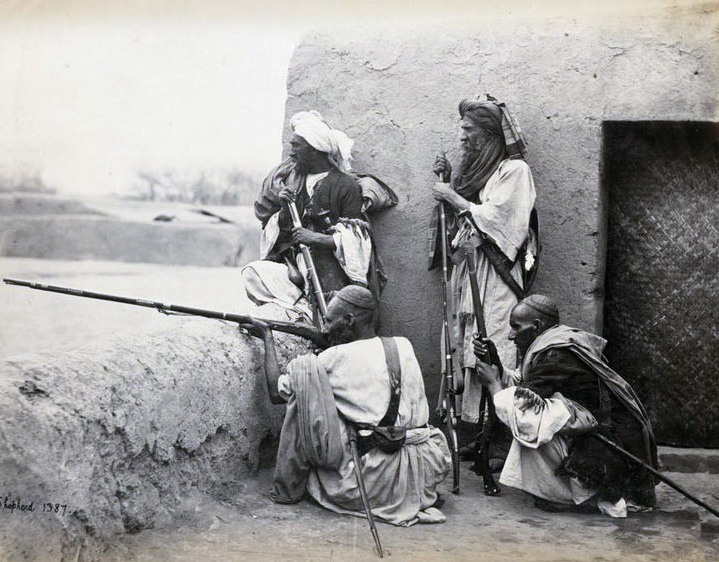
The firing continued for an hour, when the “snipers,” having satisfied their honour, relieved their feelings and expended their cartridges, went away rejoicing. The troops throughout remained silent, and vouchsafed no reply.
It may seem difficult to believe that fifty bullets could fall in a camp, only 100 yards square—crowded with animals and men—without any other result than to hit a single mule in the tail. Such was, however, the fact. This shows of what value, a little active service is to the soldier. The first time he is under fire, he imagines himself to be in great danger. He thinks that every bullet is going to hit him, and that every shot is aimed at him. Assuredly he will be killed in a moment. If he goes through this ordeal once or twice, he begins to get some idea of the odds in his favour. He has heard lots of bullets and they have not hurt him. He will get home safely to his tea this evening, just as he did the last time. He becomes a very much more effective fighting machine.
From a military point of view, the perpetual frontier wars in one corner or other of the Empire are of the greatest value. This fact may one day be proved, should our soldiers ever be brought into contact with some peace-trained, conscript army, in anything like equal numbers.
Though the firing produced very little effect on the troops—most of whom had been through the experience several times before—it was a severe trial to the wounded, whose nerves, shattered by pain and weakness, were unable to bear the strain. The surgeon in charge—Major Tyrell—told me that the poor fellows quivered at every shot as if in anticipation of a blow. A bullet in the leg will made a brave man a coward. A blow on the head will make a wise man a fool. Indeed I have read that a sufficiency of absinthe can make a good man a knave. The triumph of mind over matter does not seem to be quite complete as yet.
I saw a strange thing happen, while the firing was going on, which may amuse those who take an interest in the habits and development of animals. Just in front of my tent, which was open, was a clear space, occupied by a flock of goats and sheep. The brilliant moonlight made everything plainly visible. Every time a bullet whistled over them or struck the ground near, they ducked and bobbed in evident terror. An officer, who also noticed this, told me it was the first time they had been under fire; and I have been wondering ever since, whether this explains their fear, or makes it more inexplicable.
I have devoted a good deal in this chapter to the account of the “sniping” at Jar on the night of the 9th of October, and, perhaps, a critic may inquire, why so much should be written about so common an incident. It is, however, because this night firing is so common a feature, that I feel no picture of the war on the Indian frontier would be complete without some account of it.
The next day we crossed the Panjkora River, and I started to ride down the line of communications to the base at Nowshera. At each stage some of the comforts of civilisation and peace reappeared. At Panjkora we touched the telegraph wire; at Sarai were fresh potatoes; ice was to be had at Chakdara; a comfortable bed at the Malakand; and at length, at Nowshera, the railway. But how little these things matter after all. When they are at hand, they seem indispensable, but when they cannot be obtained, they are hardly missed. A little plain food, and a philosophic temperament, are the only necessities of life.
I shall not take the reader farther from the scene of action. He is free and his imagination may lead him back to the highland valleys, where he may continue for a space among camps and men, and observe the conclusion of the drama.

(Continue to Part 16)




